
|
(chronological by film title) Intro | Classic (1) | Classic (2) | Modern (1) | Modern (2) |
(in chronological order) |
||||||||
| Film Title/Year/Director, Setting and Brief Description | ||||||||
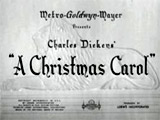
|
A Christmas Carol (1938) One of the earliest big screen adaptations of Dickens' classic tale -- starring Reginald Owen as Ebenezer Scrooge.
This MGM production was one of the earliest (and best) screen adaptations of Dickens' novel A Christmas Carol - first published in 1843. [See also the entry for the 1951 version.]. The title character was portrayed by Reginald Owen, rather than Lionel Barrymore who was the definitive hard-hearted Scrooge on the radio.
This short 69-minute Christmas family film began with the subtitle:
Old miserly humbug Ebenezer Scrooge (Reginald Owen) exhibited his hatred of his the Christmas season to his penniless nephew Fred (Barry MacKay):
Fred presented a very different, more positive view:
After he rejected a dinner invitation to Fred's place, Scrooge also fired his underpaid, kind-hearted clerk-assistant Bob Cratchit (Gene Lockhart), after one of Bob's errant snowballs accidentally hit Scrooge. Cratchit remained upbeat, bought his family's Christmas feast of a goose, and cared for their crippled youngest child Tiny Tim (Terry Kilburn). In his large empty mansion, tight-fisted Scrooge was visited later on Christmas Eve by the chained spirit of his former business partner Jacob Marley (Leo G. Carroll), who warned him to change his mean ways or suffer a cruel fate in chains in the afterlife. He explained why he was troubling Scrooge, and how he had been suffering for his own past life:
Jacob then foretold how Scrooge could escape his inevitable fate: "I am here to warn you that you have one chance of escaping my fate. One chance, Ebenezer Scrooge... You will be haunted by three spirits....Unless you suffer these three visitations, your fate will be the same as mine." After dismissing the apparition's warnings, he was haunted - as predicted - on the hour from 1-3 am, by three ghosts:
Miraculously, Scrooge vowed to change himself and repent:
Scrooge awoke on Christmas Day a reformed and different man, and quickly made amends, distributed presents and gifts. He made Fred his business partner, and at the Cratchit's home, he gave the family gifts, a large turkey, promised Bob a raise, and vowed that Bob's son Peter would have a job once he was older ("Everything for everybody!"). He then offered a rare toast:
Tiny Tim added: "God bless us, everyone." |
 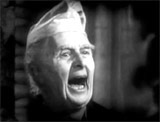 Scrooge (Reginald Owen) 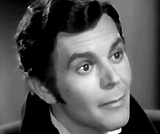 Fred (Barry MacKay) 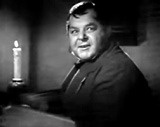 Bob Cratchit (Gene Lockhart) 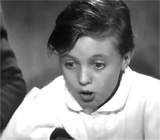 Tiny Tim (Terry Kilburn) 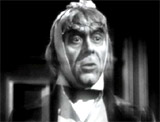 Jacob Marley's Ghost (Leo G. Carroll) 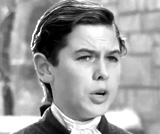 Young Scrooge (Ronald Sinclair) 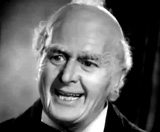 "To all of us, everywhere, a Merry Christmas to us all, my dears." 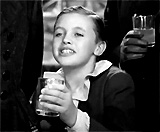 "God bless us, everyone." |
||||||
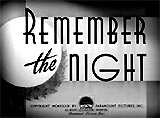
|
Remember the Night (1940) A shoplifter and her prosecutor, in the middle of her trial when she is bailed out, spend the Christmas holidays together and fall in love.
This holiday-themed, Paramount Pictures production, a romantic comedy-drama, was directed by Mitchell Leisen, with a script by Preston Sturges. It was the first of four films pairing Fred MacMurray and Barbara Stanwyck (their next film was Wilder's cynical film noir classic Double Indemnity (1944)), and similar in theme to Frank Capra's It Happened One Night (1934). Although a charming film (often neglected and little-seen), it featured an unlikely premise, that a prosecuting attorney would bail out a suspect, take her to dinner/dancing, drive her to a different state (thereby violating parole), fall in love with her and attempt to throw the trial in her favor, and attempt to marry her before sentencing. While shopping in a department store during December, attractive Lee Leander (Barbara Stanwyck) stole a diamond bracelet, and when she attempted to pawn it, the suspicious broker locked her in and called the authorities. Skilled assistant D.A. Prosecutor Jack Sargent (Fred MacMurray), known for his skill in convicting females, acquired the case and argued against Lee's defense attorney Francis X. O'Leary (Willard Robertson). When the defense verbosely and in manic-style stated that Lee was hypnotized by the seller and lured into stealing, Jack was able to get the Judge (Charles Waldron) to delay the case until after the holidays (his main intent so that his holiday plans wouldn't be postponed), due to having to wait for a hypnotist to testify as an expert witness. The delay would also be in his favor, since he believed that jurors were usually more lenient just before Christmas. After an attack of conscience, a sympathetic Jack worked with bail-bondsman 'Fat' Mike (Tom Kennedy) to bail out Lee for $5,000 (without fees). Due to a misundertanding with Mike, Lee was delivered to Jack's apartment. She was surprised at the gesture and suspected he wanted to have sex. To decide what to do with her, Jack took her to dinner at a nightclub and they danced. The hotel room where she was staying hadn't been paid (she was on the verge of homelessness), so Jack offered to drive the fellow Hoosier home for the holidays, since her family's home in Eltonville was on the way to his family's house in Wabash, Indiana, only 50 miles further. During their road trip, they were forced to take a detour on a WPA road, smashed through farmer Hank's (John Wray) fence, and found themselves on unfamiliar land in the dark. After sleeping in the car (the scene slightly evoked the Nativity story), they were awakened by a cow munching on Lee's hat. The enraged farmer with a shotgun charged them with trespassing, destruction of property, and petty larceny (for stealing milk from his cow). At Justice of the Peace Clyde Emory's (Thomas W. Ross) office in town, the two gave false names and occupations (Mary Smith, bubble dancer, and Henry Wadsworth Longfellow, steam fitter), and fled as fugitives when Lee set the trashcan on fire. When they arrived at Lee's dark childhood home, they discovered that Lee's estranged, unloving and cold mother (Georgia Caine) had remarried, and that she held a continuing loveless grudge against her thieving daughter. There was no alternative for Jack but to continue on and take Lee with him to his home. There, the couple were warmly greeted by his mother Mrs. Sargent (Beulah Bondi), spinster Aunt Emma (Elizabeth Patterson), and Jack's cousin Willie (Sterling Holloway). The lovely family festivities began with the making of popcorn to string on the tree, and the playing of the piano by Jack, and Lee accompanying Willie (singing "The End of a Perfect Day"). Even Lee was included in the gift-giving on Christmas Day, although Jack revealed to his mother that Lee was in trouble with the law and had a criminal past (with two previous offenses for stealing). There were holiday activities, including a charity bazaar rummage sale (Lee helped empty the wallet of a prominent judge), and a New Year's Eve barn dance (Aunt Emma dressed Lee in a corset and her own turn-of-the-century pinafore). At midnight on New Years, Jack kissed Lee, and although he invited Lee to his room afterwards for a cigarette, she did not visit him. Jack's mother had explained to her how Jack had worked hard to get to his present position, and asked her not to ruin him. On their trip back to New York, they drove through Canada (to avoid Pennsylvania), and at Niagara Falls, they kissed as Jack professed his love and desire to marry her. Jack tried to persuade Lee to jump bail and stay in Canada, but Lee was determined to return and face trial. Back in New York just before the trial resumed, Lee told Jack that she couldn't reciprocate his love, and that marriage would be a bad idea. During the trial, Jack tried to harshly and savagely condemn Lee on the stand in order to antagonize the jury and get an acquittal, but the strategy backfired. Fearing a lost case would hurt John's career, Lee became upset and changed her plea to guilty. It was inevitable that she would be sentenced and serve jail time as a repeat offender. Jack was angered at her for pleading guilty, and still wanted to marry her. Lee advised that if he still loved her after her imprisonment, they could reconsider, because she also loved him. In their relationship, Jack's character had become more dishonest, while Lee's character had become more honorable. |
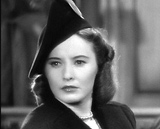 Lee Leander (Barbara Stanwyck) 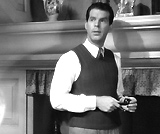 D.A. Jack Sargent (Fred MacMurray) 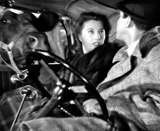 With a Cow 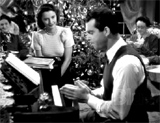 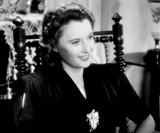 Celebrating a Family Christmas  Kissing at Niagara Falls |
||||||
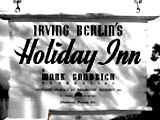
|
Holiday Inn (1942) Screen legends Bing Crosby and Fred Astaire debut the quintessential holiday song, "White Christmas" in this black and white Christmas musical.
The plot of this romantic musical film by director Mark Sandrich was spiced up with an Irving Berlin story and score (twelve songs), and it became the highest-grossing film musical up to that time. It provided a spectacle of fifteen holidays throughout the year, all presented in song and dance routines - each represented by a calendar page. The film opened on Christmas Eve in New York City at the Midnight Club, when the song-and-dance team of retiring crooner Jim Hardy (Bing Crosby) and ladies man/hoofer Ted Hanover (Fred Astaire) was breaking up. Hardy retired to his Connecticut farm alone when smooth-talking friend Hanover stole away his fiancee, singer/dancer Lila Dixon (Virginia Dale). Jim decided to turn his country house-inn into a nightclub, dubbed "Holiday Inn," that would only be open on national holidays. Jim hired wide-eyed, aspiring ingénue-singer/dancer Linda Mason (Marjorie Reynolds) as his leading lady to make his dream a success, of providing both dinner and entertainment. This film was most famous for the debut of the quintessential holiday song, "White Christmas," sung as an unaccompanied ballad by Jim to Linda. Unfortunately, Ted (after being dropped by Lila for the "most wonderful millionaire in world" in Texas on New Year's Eve) was again partner-less (and obsessed about finding a replacement), and he arrived at the inn to drown his sorrows - and to capture Linda as his new dance partner. Of course, romantic shenanigans ensued between the two pairs, and it appeared that Ted and Linda were going to get married in Hollywood during the holidays. By film's end, however, Ted was reunited with Lila, and Jim and Linda were also a couple. The two duos performed together on New Year's Eve at the Holiday Inn in the conclusion. |
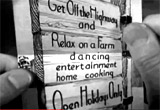 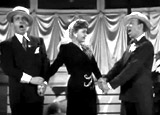 Jim Hardy (Bing Crosby), Lila Dixon (Virginia Dale), and Ted Hanover (Fred Astaire) 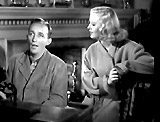 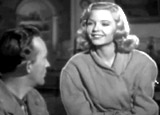 Jim and Linda Mason (Marjorie Reynolds) singing "White Christmas" 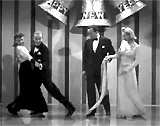 The Two Couples |
||||||
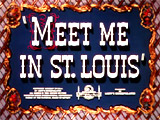
|
This holiday musical starring Judy Garland features the debut of the classic song, "Have Yourself a Merry Little Christmas."
This film remains a delightful, classic, nostalgic, poignant, and romanticized musical film - and one of the greatest musicals ever made. Vincente Minnelli's gorgeous musical (his third film and his first in color) romanticized and idealized the turn of the century in the year 1904. It was the second highest-grossing film for MGM up to that time. The film was structured as a series of coming-of-age vignettes (four in number). Different acts represented the seasons from summer 1903 to spring 1904 that concluded in the year of the St. Louis World's Fair/Exposition. Each segment marked changes and rites of passage - and was introduced by a filigreed tintype from the Smith family album - each static, initially sepia-toned image turned into color and came to life. Although the winter segment was one of the shortest vignettes, the film is still considered a favorite Christmas movie. The opening image for winter was a nostalgic, Currier-and-Ives view of a horse-drawn sleigh, the sound of sleigh bells, and youngsters sledding down the lawns of Kensington Avenue in the winter sunshine. The city, and the well-to-do Smith family (with four beautiful daughters) living in the suburbs was on the verge of hosting (and celebrating) the arrival of the spectacular World's Fair. However, the family's head of the house was beckoned to New York due to a job promotion - an uprooting move that threatened to indelibly change the lives of the family members forever. Judy Garland portrayed winsome daughter Esther Smith, who in this last part of the film had just returned home late at night after a Christmas Eve ball. She found her distressed sister 'Tootie' (Margaret O'Brien) worried and wondering about the prospect of moving from their beloved home:
Esther reassured her and placed her warming wrap around her shivering sister: "Oh, you can't fool him. He can find anybody he wants to find." Obviously upset, 'Tootie' sadly declared: "I'm taking all my dolls, the dead ones too. I'm taking everything." When Esther reminded her that she must leave behind her snow people she had built in their yard, there was a haunting view of their backyard lawn full of Christmas snowmen, seen from her bedroom window. In one of the most memorable scenes of the film, Esther consoled her distraught sister 'Tootie' - compassionately and sweetly singing the wistful song "Have Yourself a Merry Little Christmas" while at the window. Her solemn voice was accompanied by the tinkling of 'Tootie's' antique monkey music box. Lovingly and tenderly photographed, Esther touchingly sang of hope:
Sobbing, 'Tootie' was most affected and traumatized by the thought of moving and abandoning her snow people - a group that represented her once-happy family. To show her emotional upset and misery after the song was finished, she ran in her nightgown from the house - and hysterically and maniacally decapitated the Christmas snowmen. She bludgeoned and destroyed them because they could not go to New York with the family: "Nobody's gonna have them. Not everybody's going to New York. I'd rather kill them if we can't take them with us." Esther vainly attempted to comfort her utterly despairing sister by kneeling and embracing her. 'Tootie' drowned out her words with her ceaseless crying:
Ultimately, Mr. Smith reconsidered the move, and decided to compromise with his family and stay in St. Louis after all, refusing his company's promotion regardless of the work prospects and other consequences. |
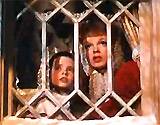 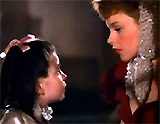 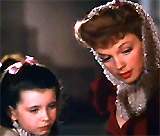 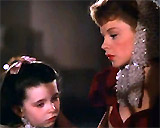  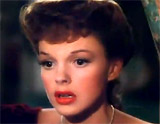 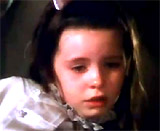 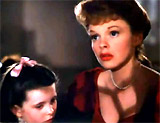 Esther (Judy Garland) with Tootie (Margaret O'Brien) |
||||||
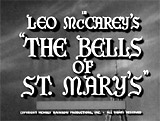
|
The Bells of St. Mary's (1945) A Catholic parish priest and a Sister Superior in an attached parochial elementary school in NYC joined together to help save the almost-condemned school, educate the children with unconventional methods, solve family problems, and improve life for everyone.
This sprightly, entertaining, family-oriented (holiday favorite) and sentimental sequel to Paramount Pictures' Best Picture- and Best Director-winning Going My Way (1944) was a major box-office hit - it ended up being the most profitable picture in the history of RKO Studios. It was the first sequel to be nominated for an Academy Award for Best Picture. Along the way, likeable crooner Bing Crosby sang "Adeste Fidelis" and "The Bells of St. Mary's" with a children's choir, and he soloed with "O Sanctissma," "Aren't You Glad You're You," and "In the Land of Beginning Again." In the musical drama, modern-minded (progressive) and warm-hearted priest Father Charles "Chuck" O'Malley (Oscar-nominated Bing Crosby reprising his earlier Oscar-winning Best Actor performance) was assigned to minister in a NYC parish with a Catholic parochial elementary school attached named St. Mary's Academy. He soon found himself in a good-natured rivalry and conflict with the rules-oriented, stubborn and headstrong Swedish-American Sister Mary Benedict (Ingrid Bergman, the Best Actress winner from the previous year) - of the adjoining elementary school. [Note: Her character replaced Barry Fitzgerald's role in the previous 1944 film.] The inner-city school was run-down and about to be condemned, and could possibly be shut down. It was threatened with being demolished by a greedy neighboring land owner who wanted to rebuild the area. In a series of episodic events, behind the scenes, O'Malley helped to convince penny-pinching, cranky, wealthy neighboring land-developer-businessman Horace Bogardus (Henry Travers) to donate his under-construction structure as a new addition to the school, rather than purchase the crumbling school for use as a parking lot. The benefactor Bogardus was cleverly convinced to have a change of heart and donate his soon-to-be-completed modern office building next to the school. At Christmastime, the younger St. Mary's kindergarten students were rehearsing a very revised, staged Nativity pageant, including a chorus of "Happy Birthday" (for the Virgin Birth). In a series of other episodic events, O'Malley (often with Sister Mary's assistance) also helped to educate the children with unconventional methods, solve family problems, and improve life for everyone. In one case, Sister Mary taught one of the young boys, Eddie Breen (Richard/Dickie Tyler) to learn to box in order to defend himself against school bullies. In another, the two helped one of the boarding students - troubled teenaged daughter Patricia 'Patsy' Gallagher (Joan Carroll) of single mother Mary Gallagher (Martha Sleeper) of Syracuse, NY to be allowed to graduate from the 8th grade (even though she purposely failed her exams, in order to stay in the school rather than be sent back home). Their broken family was also reunited with the missing musician-husband-father Joe Gallagher (William Gargan) who walked out on them years earlier after Patsy's birth. In addition to the main plot, Sister Mary was kept in the dark about a diagnosis of an early stage of tuberculosis by Dr. McKay (Rhys Williams), and she presumed it was because of her frequent arguments and disagreements with O'Malley, and his request to get rid of her. When O'Malley decided to tell her the real reason for being transferred and sent away to a desert state to recover, she was relieved and joyful, and became resolved to restore her health, and return with added vigor and strength to see her dream of a new school come true. |
|||||||
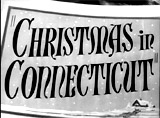
|
Christmas in Connecticut (1945) Elizabeth (Barbara Stanwyck) transforms from spinster Manhattanite to perfect housewife when her boss invites himself for Christmas. A war hero has Christmas dinner with the Martha Stewart-esque Barbara Stanwyck (who actually can't cook) in this holiday farce.
This delightful, light-hearted screwball romantic comedy (remade poorly as a TV movie in 1992 with Dyan Cannon and Kris Kristofferson) is a perennial Christmas favorite from director Peter Godfrey. Barbara Stanwyck portrayed Elizabeth Lane, a Martha Stewart-like food writer for Smart Housekeeping magazine who misled her readership. In her column "Diary of a Housewife," she wrote about her perfect life on a Connecticut farm with a husband and eight month-old son, great recipes and furnishings, etc. She was regarded as "the finest, most exemplary wife and mother." However, she was a spinster - there was no husband, no country house and no baby, she wasn't a gourmet cook (she got her recipes from her Hungarian Uncle Felix Bassenak's (S.Z. Sakall) restaurant), and she lived in a modest, high-rise apartment in Manhattan. Elizabeth's corpulent mogul publisher Alexander Yardley (Sydney Greenstreet) and returning, wounded Navy war hero-sailor Jefferson "Jeff" Jones (Dennis Morgan) (who had hallucinated about fine dining during eighteen days on a life raft!) invited themselves to her rural farm-home for an old-fashioned, traditional family Christmas Eve gathering. The manipulative writer was worried that she might lose her job due to her charade. Exasperated, she was forced to spin a cover up of all of her deceitfulness, asking herself:
She didn't want to lose her well-paid job, her mink coat, and her lifestyle, so decided upon an elaborate and complicated ploy. So she agreed to have snooty, humorless, unromantic, stuffy and infatuated architect John Sloan (Reginald Gardiner) stand in as her beau (and actual wedding arrangements were made with a local befuddled Judge Crowthers (Dick Elliott)). Elizabeth's long-time suitor Sloan had been dogging Elizabeth for a proposal but she had always refused until now. She also asked restaurant chef Uncle Felix to cook for her - he agreed although he regretted helping her with the ploy: "I know I shall regret this for the rest of my life." And she 'borrowed' Sloan's idyllic farm (with a cow named Macushla). The planned marriage ceremony between Elizabeth and John was continually interrupted and postponed, by circumstances, deliberate delays or deceptions, poor timing, and unexpected arrivals. And John's instincts were accurate - Elizabeth was falling in love with Jones during the festivities (especially during a flirtatious sleigh ride together following a barn dance). Yardley soon began to suspect that Jones was having an affair with Elizabeth. The screwball plot intensified with multiple borrowed stand-in babies (a blonde boy, a dark-haired girl) brought in to impersonate her family's child, and cared for by Norah the housekeeper (Una O'Connor). Further complications ensued when Jones and Elizabeth were arrested and spent the night in jail for 'stealing' the sleigh, and when Yardley called state troopers when he suspected one of the babies was kidnapped (the real mother was just picking up the baby!). And then, Jones' naval hospital nurse Mary Lee (Joyce Compton) arrived, with news that she was engaged to marry - although she turned out to be engaged to Jones' shipmate buddy Sinkewicz (Frank Jenks). When Elizabeth eventually admitted the truth to Yardley that she wasn't married, she was fired and after a quarrel, she broke up with Sloan. Yardley soon reinstated her with a doubled salary raise (Uncle Felix convinced him that a rival publisher would hire her away). Elizabeth also admitted - finally - that she wasn't married, thereby freeing up Elizabeth and Jeff Jones to consummate their hesitant 'love at first sight' over two days, although he was warned by Yardley that Elizabeth couldn't cook. The film ended with rotund Yardley's line:
|
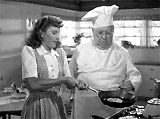 Elizabeth Lane (Barbara Stanwyck) with Uncle Felix (S.Z. Sakall) 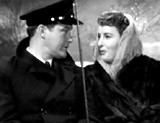 Elizabeth With Naval Hero Jefferson "Jeff" Jones (Dennis Morgan) 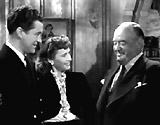 With Publisher Alexander Yardley (Sydney Greenstreet) 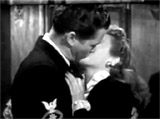
Jeff and Elizabeth |
||||||
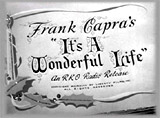
|
How does one person affect the lives of others? George Bailey (James Stewart) gets a glimpse on Christmas Eve. He is about to commit suicide - and it takes the entire town of Bedford Falls to turn him around in this inspirational classic featuring a whimsical guardian angel named Clarence.
This moving, inspirational, much-loved perennial Christmas classic from director Frank Capra is one of the most popular and heartwarming films ever made. It was actually a box-office flop at the time of its release, and only became the Christmas movie classic in the 1970s due to repeated television showings at Christmas-time. The dark, bittersweet post-war tale was about the life (seen in flashback) of savings-and-loan manager George Bailey (James Stewart) who struggled in his small town against a greedy, rich and evil tycoon-banker Mr. Potter (Lionel Barrymore) and his own self-doubting nature. He began to suffer many hardships, sacrifices, mishaps and fateful trials, including compromised dreams of his youth to leave the town and seek fame and fortune. Facing financial ruin and an urge to commit suicide, earnest down-on-his-luck do-gooder George became hysterical, melancholy and despairing. He was given encouragement and assistance by a whimsical, endearing, trainee guardian angel named Clarence Oddbody (Henry Travers). He was allowed to see what life in his town of Bedford Falls would have been like if he hadn't been born (now named Pottersville after the town's despotic tycoon). It was a frightening, nightmarish, 'alternative reality' noirish view of the world and the town (at Christmas-time) without George as he staggered through the town. He visited his brother Harry's (Todd Karns) gravesite who would have died in the childhood sledding accident ("at the age of nine" according to Clarence) because George wasn't there to save him - and Harry would have never grown up to be a war hero, saving all the lives of the men on the naval transport: ("Every man on that transport died. Harry wasn't there to save them because you weren't there to save Harry"). Clarence reminded George:
Only then was he brought back from self-destruction - to recognize that his life was wonderful and truly rich, even in its humdrum and bleak nature. George broke down and made a heartfelt plea to Clarence to live again: ("Get me back!...I want to live again") - and joyfully discovered that his wish was granted and that he was alive (because his mouth was bleeding, he had a deaf ear, and he felt daughter Zuzu's petals in his pocket). The tale of near-suicide and depression during the Christmas season came full circle when George returned to the idyllic, small-town world that he had left, with renewed faith and confidence in life itself. With resounding ecstasy, he ran down the wintry Bedford Falls street yelling "Merry Christmas" at everything in sight (the movie house, the Building and Loan, etc.). In his home in a heartwarming reunion scene, he was surrounded by family and friends supporting him and his beleaguered family, especially his beautiful long-suffering wife Mary (Hatch) Bailey (Donna Reed). There were also depositors who had paid his rent, a toast was offered by his war-hero brother Harry: ("A toast...to my big brother, George. The richest man in town"), and the singing of Hark the Herald Angels Sing and Auld Lang Syne.
When an ornament bell chimed on the Christmas tree (signifying Clarence's promotion to an angel with wings), George's daughter Zuzu (Karolyn Grimes) reminded him of his adventure with Clarence:
|
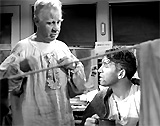 Angel Clarence (Henry Travers) 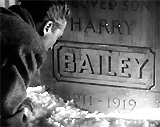 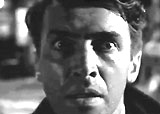 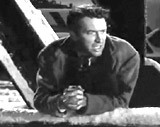 Nightmarish Pottersville for George Bailey (James Stewart) 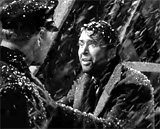 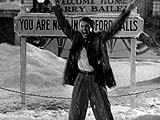 Joyful Return to Bedford Falls |
||||||